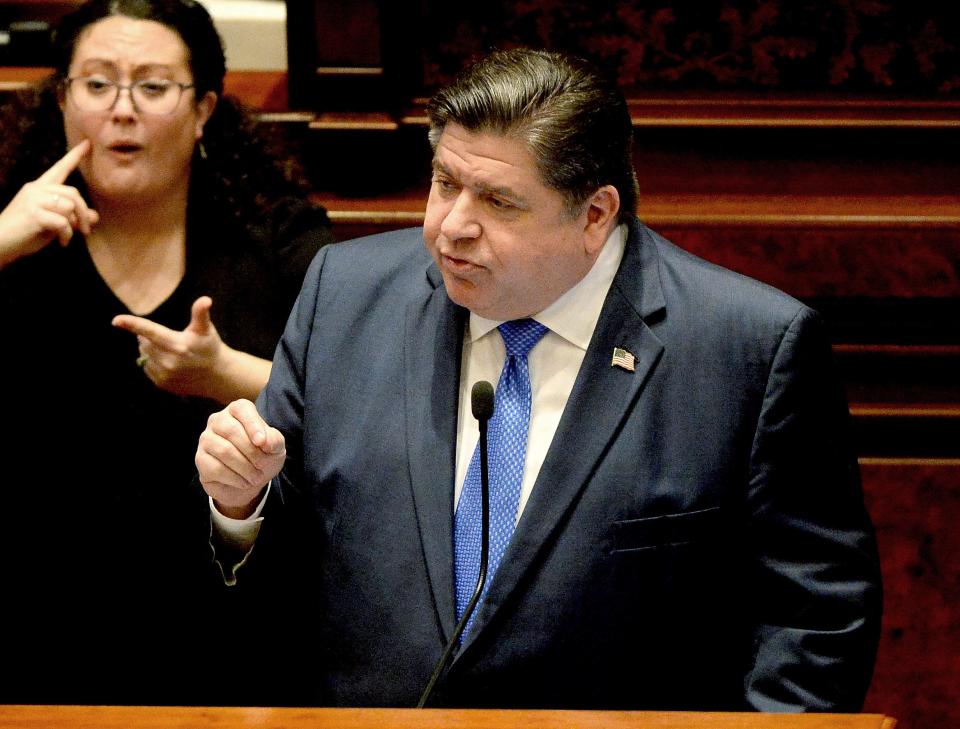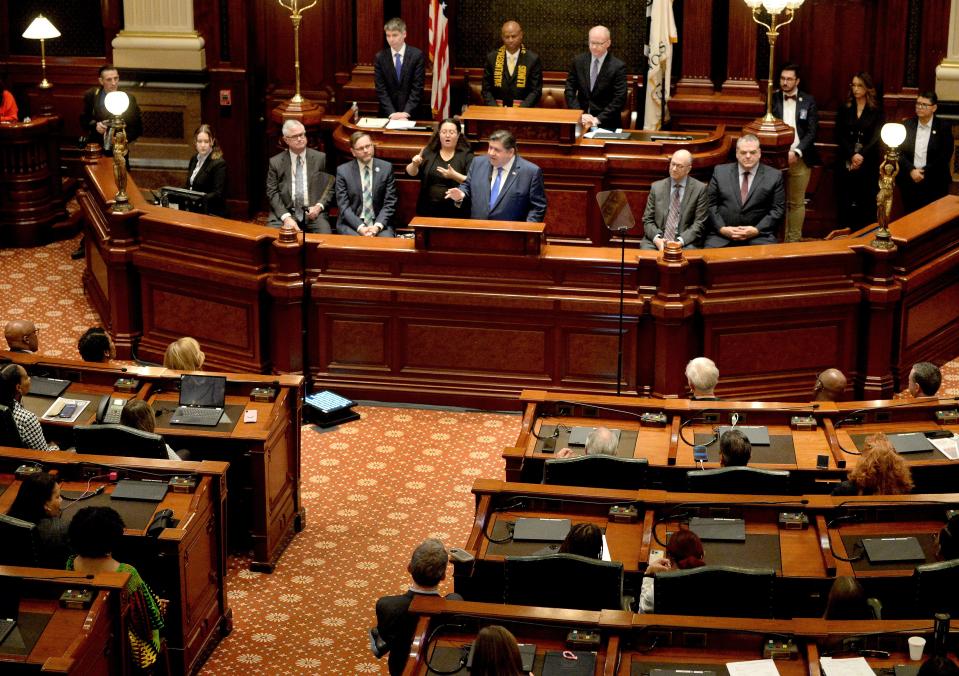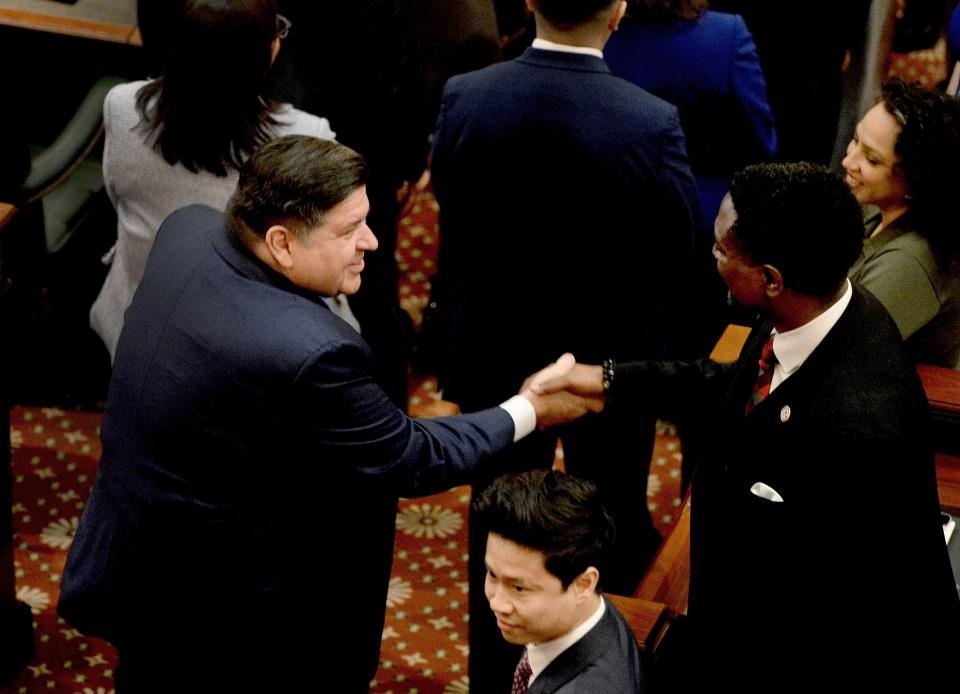Pritzker’s budget proposal calls for child tax credit, elimination of grocery tax
Gov. JB Pritzker announced a $52.7 billion budget proposal before the General Assembly on Wednesday.
Pritzker's sixth budget address as governor estimates the state will receive $52.9 billion in revenues, making for a $298 million surplus, for the fiscal year starting on July 1. Prior projections from the Governor's Office of Management and Budget tallied an almost $900 million deficit in the upcoming fiscal year.
"Tough" decisions were made this year, the governor admitted, where state departments such as the Illinois State Board of Education saw their $653 million funding increase request be shorted by more than $200 million.

Still, given a commitment to passing balanced budgets and responsible use of federal COVID-19 funds, Pritzker said the state's fiscal present and future remains strong.
"Do not let the doom grifters steal your optimism about what’s ahead for Illinois," he said in the House chambers. "Our future is bright, and opportunity lies ahead."
The proposal continues funding for programs such as Smart Start Illinois, topping more than $400 million in its second year as it aims to provide universal preschool by 2027, and Rebuild Illinois in addition to new spending items.
Pritzker introduced a projected $12 million child tax credit for working families with children under the age of 3. All told, the proposed credit would be 20% of the taxpayer’s state earned income tax credit. The governor's proposal comes after lawmakers are leading a separate tax credit estimated to cost more than $300 million.
Families could also be benefited by the governor’s proposed elimination of the state’s 1% grocery tax. The tax was previously suspended from July 1, 2022 through July 30, 2023.

“It’s one more regressive tax we just don’t need,” said Pritzker. At the same time, however, he is calling for the sports wagering tax to increase from 15% to 35% — bringing the state an additional $200 million in tax revenues.
Another program introduced would set aside a $10 million appropriation to erase $1 billion medical debt for 340,000 Illinoisans. The state would partner with a national non-profit called RIP Medical Debt with the goal to eliminate $4 billion in medical debt over the next four years.
"Treating a health emergency is not an optional expense," said Pritzker. "But too many Illinoisans have had their credit ruined or have been pushed into bankruptcy when they had one unexpected accident or one prolonged illness."
The program would be administered by the Illinois Department of Healthcare and Family Services, which again makes up the lion's share of the budget. The proposal calls for $39.4 billion for IDHFS, mostly going to the state's Medicaid program.
The department also houses the Health Benefits for Immigrant Adults and Health Benefits for Immigrant Seniors programs, which provides medical services to those 42 and older regardless of their immigration status.
The program was one of much budget controversy last year after earlier proposed funding did not match expenditures. Enrollment in HBIA and HBIS, topping 68,000 enrollees, has been paused since November and started requiring co-payments for some non-emergency services earlier this month.
Projected to cost the state more than $773 million this fiscal year according to IDHFS, Pritzker's proposal calls for $629 million to be invested.
As expected, Pritzker called on the legislature to earmark an additional $182 million in the budget for the migrant crisis. It is part of a $252 million plan, Cook County chipping-in $70 million, to help Chicago provide shelter and services to the more than 35,000 asylum-seekers transported from Texas to the city since August 2022.

Republicans have called repeatedly for the state to stop accepting migrants. The Democratic governor has no plans to meet their demands.
“Maybe some of you think that we should just say ‘this is not our problem,’ and that we should let the migrant families starve or freeze to death,” said Pritzker. “But that's not what decent Midwesterners do. That's not what leaders do.”
“We didn't ask for this manufactured crisis but we must deal with it all the same.”
Contact Patrick M. Keck: 312-549-9340, [email protected], twitter.com/@pkeckreporter.
This article originally appeared on State Journal-Register: Pritzker proposes more than $50 billion budget. What you need to know
